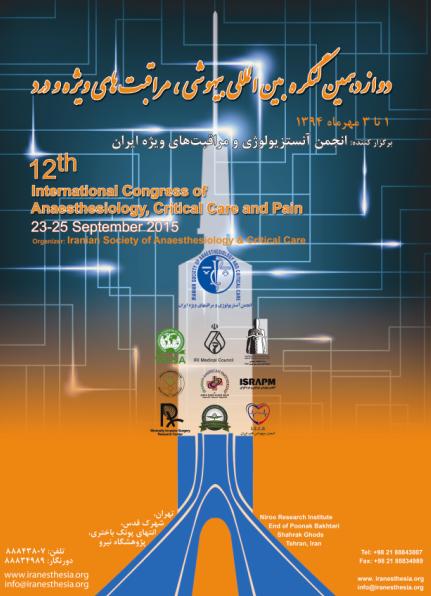
IRIMC President's speech in the 12th International Congress of Anaesthesiology, Critical Care and Pain:
“In the name of God, the Compassionate, the Merciful.
Ladies and Gentlemen,
Distinguished Guests,
Dear Colleagues
It is my great pleasure to address my colleagues and
the distinguished guests of anaesthesiology community on the auspicious occasion
of the International Congress of Anaesthesiology. Allow me first to pay tribute to all renowned
and noted anaesthesiologists who have made significant contributions to
national anaesthesiology community and considerably promoted national
healthcare system.
In my own name and on behalf of Iranian Medical
Council, I would like to convey my heartfelt wishes and greetings to Congress
Organizing Committee and all distinguished guests.
The medical expertise of recent generations of
anaesthesiologists has significantly expanded the role of the
anaesthesiologist. Historically, the anaesthesiologist’s role was limited to
that of the physician who administers anaesthesia to suppress pain and
consciousness in a patient undergoing surgery. Now, anaesthesiologists also
provide medical care in settings other than the operating room. In other words,
anaesthesiology has been an integral and crucial part of the medical team.
We can define anaesthesiologist as the perioperative
physician- the “all-around” physician responsible for providing medical care to
each patient undergoing surgery at all stages. This includes providing the
medical evaluation of the patient before surgery (preoperative), holding consultations
with surgical team, providing pain control and support of life functions during
surgery (intraoperative), supervising care after surgery (postoperative), and
discharging the patient from the recovery unit.
Specifically, the anaesthesiologist’s role has moved
beyond just the operating room and into other areas of care.
Anaesthesiologists play a vital role in assessing a
patient’s medical readiness for surgery. They are unique in their advanced
knowledge of both the medical illnesses a patient undergoing surgery may
suffer, as well as the effects on the body of the specific operation to be
performed.
In the operating room, they are responsible for the
medical management and anaesthetic care of the patient throughout the duration
of the surgery. The anaesthesiologist must carefully match the anaesthetic
needs of each patient to that patient’s medical condition, responses to
anaesthesia and the requirements of the surgery.
Anaesthesiologists have important functions outside of
the operating room including monitoring patient and discharging him/her from
the recovery unit.
The domains of functions of anaesthesiologists can be
summarised as:
Preoperative Evaluation, Intraoperative Care, the
Postanaesthesia Care Unit (PACU) or “Recovery Room”, Critical Care and Trauma
Medicine, Intensive Care Units: Burn ICU, Neuro ICU, VA ICU, Cardiovascular ICU,
Surgical ICU; Pain Medicine, Acute Pain Management, Chronic and Cancer Pain
Management, Obstetric Anaesthesia, and Ambulatory and Office-Based Anaesthesia.
Some of the most significant strides in medicine and
surgery are directly attributable to anaesthesiology’s advances in patient
monitoring, improved anaesthetic agents and new drug therapy.
Most recent advances have contributed to an important
decrease in morbidity from anaesthesia and to an increase in quality of
perioperative care. The anaesthesiologists participate in research and clinical
studies as well as medical education programs and legislative activities.
In the past, complications caused by the use of
anaesthesia were a medical issue, however during the past 25 years, complications
have significantly declined. Despite the growing need for anaesthesia and the
increasing of the total number of anaesthesiologists practicing nationwide,
patient outcome have improved.
Now, it is safe to say that anaesthesia is less risky
than ever.
A close ally to Iranian Medical Council, Iranian
Association of Anaesthesiology & Critical Care is one of the most established
and distinguished medical associations which
has made significant contributions to the science of anaesthesiology resulting
in achieving highest possible standards in anaesthesiology nationwide.
As the President of Iranian Medical Council, I would
like to take this opportunity to thank the academicians, scholars and medical
scientists in the field of anaesthesiology for their consistent efforts and
contributions to national health system.
Thank you for your attention.”